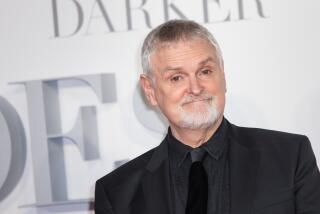FILM COMPOSER WITH HUMAN TOUCH
- Share via
For film composer Mark Isham, electronic and acoustic sounds have equal weight--aesthetically and financially.
“If you want a traditional orchestra, you should use one,” said the 34-year-old composer of sound tracks to such films as Carroll Ballard’s “Never Cry Wolf” (1983), Gillian Armstrong’s “Mrs. Soffel” (1985) and Alan Rudolph’s “Trouble in Mind” (1986). “I can’t see that you’ll save any money doing it electronically. It takes just as long to get it to sound good, to get the nuances, do the multi-tracking, and so on.”
Isham, whose scores are replete with electronic music, is hardly a turncoat. Rather, he insists on a judicious use of modern miracles like synthesizers and samplers (devices that reproduce electronically a previously recorded sound or instrument).
“The whole point of using this new stuff,” he said, “is to come up with sounds you can’t get any other way. Electronics allow for a lot of experimenting. I’ve been in the studio with great string players who’ll try anything, but I’ve also been with others who say ‘You want us to do that ?’, and that’s a drag. So, if I have these sounds as samples, I can work it out on my own.”
Before “Never Cry Wolf,” Isham played trumpet and keyboards with a wide variety of groups, including the San Francisco and Oakland symphonies, Van Morrison (with whom he worked from 1978 until 1983), the Beach Boys, Group 87--with Terry Bozzio, Patrick O’Hearn and Peter Maunu--and Art Lande’s Rubisa Patrol. He’s recorded extensively with almost all of his past associates and has two LPs out on the Windham Hill Label, “Vapor Drawings,” a solo album, and “Film Music,” which includes scores to “Mrs. Soffel” and “Never Cry Wolf.”
A musician who’s been influenced by such jazz giants as Miles Davis and John Coltrane, Isham’s never had the trumpet far from hand. He hasn’t performed in public with it lately, though. “My recent tours have been with electronic-oriented groups,” he said. “But I’ve really missed playing my trumpet, so I plan to do that more.” Tonight, he’ll lead a quartet--with an accent on his horn work and featuring guitarist Mauna, bassist Doug Lunn and drummer Mike Barcemanto--at the Palace Court.
One of the advantages of electronic composing, Isham insists, is being able to get an idea of how what you’ve written will sound. “Let’s say you’ve just written something for five trombones,” he proposed during a recent conversation at a San Fernando Valley rehearsal studio. “Now maybe you’d like to see how it would sound with four flutes and a piccolo. You use the sampled sounds to give you an idea of whether that would work. You can certainly save yourself time that way.”
Still, “the individual can never be replaced” by the machine, Isham said. “In the end, if I like the sound of four flutes on the electronic sample, I’d hire the four flute players” to do the recording.
As a starting point for a score, the Manhattan-born Isham sees instrumentation and sound textures of prime importance. “I pick the orchestra I want and then get it in front of me, electronically,” he said. “Then I’ll throw up some sounds and see what works. Once these sounds take shape, then the musical ideas will come out.”
Isham’s scores are different, reflecting this acoustic-electronic sensibility that’s a basic part of his musical personality. “Trouble in Mind” has moments where what appears to be an electronic steel marimba plays against strings and soprano saxophone, and piano intertwines with subtle yet ringing electronic string-like tones in “Mrs. Soffel.” “Never Cry Wolf” features synthesizers along with bassoons, bamboo flutes, glass harmonica and a 20-piece string section.
Isham feels the shift from his eclectic pop/jazz/classical stance to the film medium to be ideal. “Not only have I found something that I really enjoy doing that my music fits well into,” he said, “but (film music) has opened up a whole new market for me. Now I have a budget, a chance to be exposed, all the things I had been fighting for years to do.”
More to Read
Only good movies
Get the Indie Focus newsletter, Mark Olsen's weekly guide to the world of cinema.
You may occasionally receive promotional content from the Los Angeles Times.










